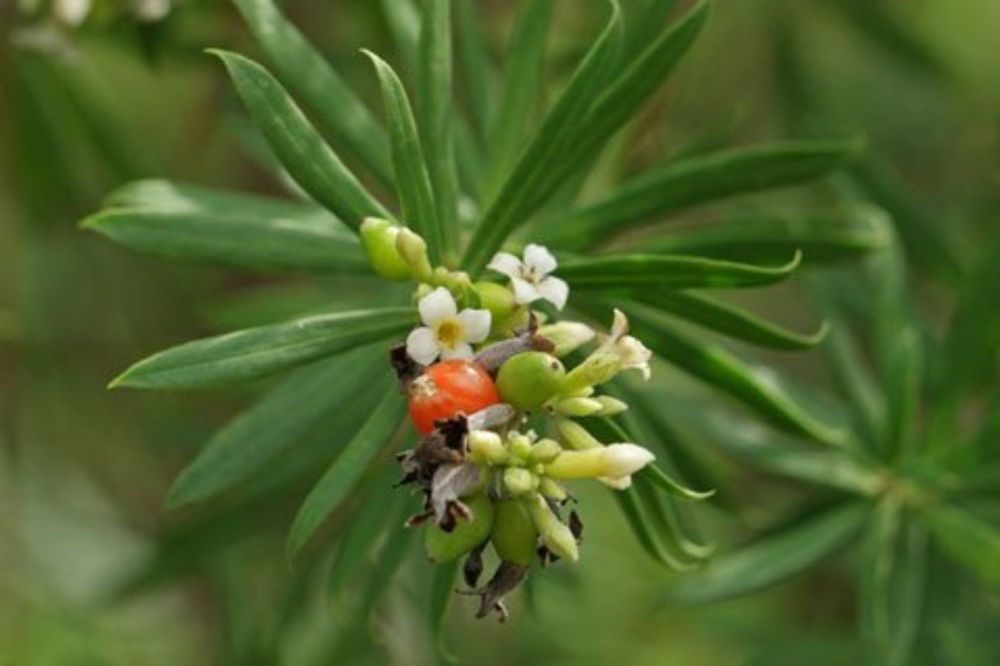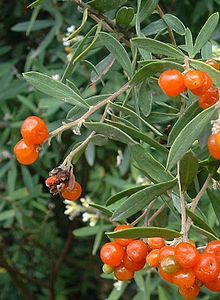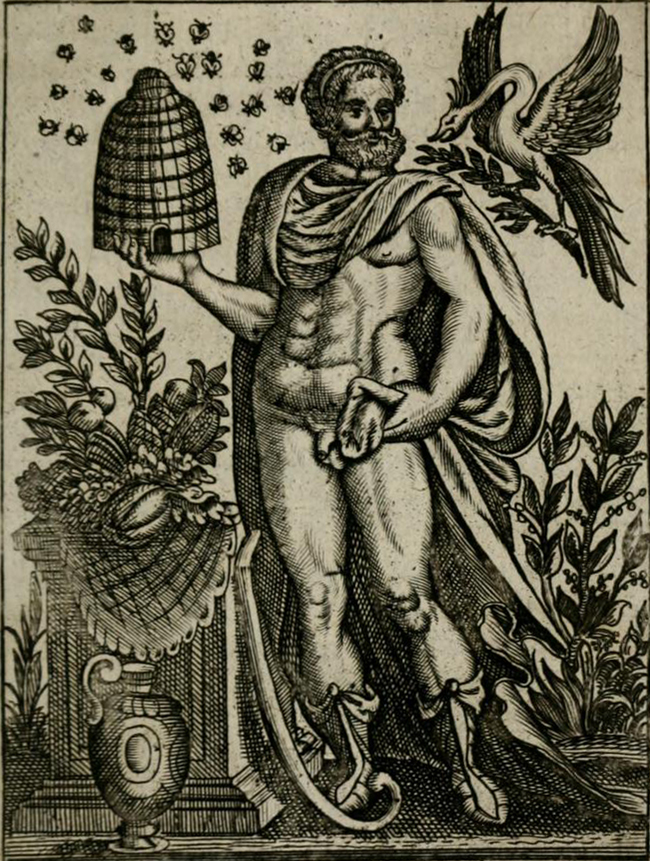斯人如桂:古罗马人的诗意田园
(五)维吉尔的肉桂树
老普林尼在《植物史》第12卷第43章提到:“Cassia也被种植在我们的国土范围内,植在帝国的最边缘地区,在莱茵河两岸,栽在蜂巢附近的cassia非常繁茂。但是,它们没有被灼热的阳光烤过后的烧焦的颜色,因此也没有和来自南方的物种相似的气味”。
(Cassia is also planted in our part of the world, and, indeed, at the extreme verge of the Empire, on the banks of the river Rhenus, where it flourishes when planted in the vicinity of hives of bees. It has not, however, that scorched colour which is produced by the excessive heat of the sun; nor has it, for the same reason, a similar smell to that which comes from the south. )
我在前面的章节已经讨论过了,莱茵河两岸的cassia 绝不可能是真正的肉桂,应该是本土的一种气味比较芬芳的植物。到底是哪一种呢?
我在英国近代著名学者约翰·萨格恩特 (John Sargeaunt , 1857–1922)的研究著作《维吉尔的树、灌木和植物》(The Trees, Shrubs and Plants of Virgil,1920年出版)中找到了答案。维吉尔的《农事诗》里多处出现了casia (或casias, casiae), 萨格恩特认为诗人分别写了两种不同的植物。一种是圣经里的肉桂,即Laurus cinnamomum (注:也叫Cinnamomum verum 锡兰肉桂),“这是一种东方植物,没有在意大利种植,但是芳香的树皮被进口到该国。被喜欢香味的男人当作香来用,与油混在一起做成软膏,与末药一起放在葬礼的柴堆里”。(It is an Oriental plant, and was not cultivated in Italy, but the aromatic bark was imported. It was used as a scent by men who liked scent, with oil when used as an unguent, and together with myrrh in funeral pyres.)另外一种是蜡叶芫花(Daphne Gnidium),“与我们花园里的桂叶芫花和欧亚芫花相类似。它是意大利原生植物,但似乎不生长在亚平宁山脉的东侧。维吉尔将它推荐给养蜂人,开白花,红色的小浆果非常辛辣,但常用于泻药,药名为‘Granum Gnidium’。花朵用于编织花环”。(akin to the spurge-laurel and the mezereon of our gardens. It is a native of Italy, but seems not to occur on the eastern side of the Apennines. It has a white flower, which Virgil commends to bee-keepers, and a small red berry, very acrid, but used in aperient pills under the name of ' granum Gnidium.' The flowers were used in garlands. )
有了这些植物学知识,我们就可以更好地理解古罗马最伟大的诗人维吉尔(Virgil,公元前70年-公元前19年)的《农事诗》。现将含有Cassia的段落摘录如下,我们可以根据上下文,轻易判断出哪些是肉桂,哪些是蜡叶芫花:
第二卷:
“关于丘陵地区贫瘠的砾石,只能生长卑贱的蜡叶芫花和迷迭香,无法为蜜蜂提供充足蜜源。被黑水蛇吃光了的粗糙的石筍和石灰石表明没有其他地方能给蛇类如此甜美的食物,或者给它们提供如此蜿蜒的隐蔽处”。
(For as to the hungry gravel of a hilly country, it scarce serves the bees with lowly casias and rosemary; and the rough tufa and the chalk that black water snakes have eaten out betoken that no other lands give serpents food so sweet, or furnish such winding coverts.)
(从其他网站下载的蜡叶芫花)

第二卷:
“哦,快乐无比的农民,他们能感受自己的幸福吗!对他们而言,远离战争冲突,最公平正义的大地,不需命令或祈求她,就轻轻松松地从她的土壤里捧出各种东西。如果没有一群人在黎明时分从庄严豪宅的正门出来迎接主人,如果他们永远不盯着镶着可爱的玳瑁的大门看,或不被镶金的门帘蒙蔽了双眼,或不盯着埃菲拉青铜器,如果他们洁白的羊毛还没有沾上亚述染料,他们纯净的油还未被肉桂污染,该有多好。更何况他们高枕无忧,过着淳朴又充满着丰富内涵的生活。广阔的土地、山洞、天然湖泊、凉爽的山谷,黄牛的低吟以及树下的酣睡 - 一切的平和宁静全部属于他们。他们有林间空地和狩猎场,年轻人辛苦劳作,习惯了吃的很少;敬拜神,敬老;当正义之神离开大地时,在他们当中留下了最后的足印”。
(O farmers, happy beyond measure, could they but know their blessings! For them, far from the clash of arms, most righteous Earth, unbidden, pours forth from her soil an easy sustenance. If no stately mansion with proud portals disgorges from its halls at dawn a flood of those who have come to greet its lord, if they never gaze at doors inlaid with lovely tortoiseshell or at draperies tricked with gold or at bronzes of Ephyra, if their wool’s whiteness is not stained with Assyrian dyes or the service of their clear oil is not spoiled with cassia: yet they have sleep free from anxiety, a life that is innocent of guile and rich with untold treasures. The peace of broad domains, caverns, and natural lakes, and cool vales, the lowing of oxen, and soft slumbers beneath the trees – all are theirs. They have woodland glades and the haunts of game; a youth hardened to toil and inured to scanty fare; worship of gods and reverence for age; among them, as she departed from the earth, Justice left the last imprint of her feet.)
 (肉桂)
(肉桂)
第四卷:
“首先要为你的蜜蜂寻找一个固定居所,一个背风的地方,因为风会阻挠它们把食物带回家 – 在那里母羊或嬉戏的孩子们不会践踏花朵,迷途的小母牛不会碰掉草地上的露珠或伤了春草。让全身布满闪亮鳞片的蜥蜴、食蜂鸟和胸前沾着鲜血的普罗柯尼(即燕子)远离肥沃的牲口棚。因为这些鸟类到处打劫,当蜜蜂在飞翔时,成为它们含在嘴里的一块甜食,带回去给残忍的幼雏。让蜂房靠近清泉、碧绿的池塘或穿过草地的小溪流,并用棕榈树或巨大的野生橄榄树为路口遮阴。当新国王带领一大帮蜂群在春天蜂拥而至时,年幼的蜂享受着刚刚离巢的自由,附近的河岸能吸引它们去避暑,行进途中的一棵树提供了遮阳的绿叶。无论是在静止或奔流的水面,都有下垂的柳枝和巨大的石头,如果它们不巧被东风打湿,或被阵阵狂风吹到洪流里,这些都是它们可歇脚的桥梁,以便在太阳底下张开翅膀。尽心让苍翠的蜡叶芫花绽放,让野百里香的芬芳远扬,浓香的薄荷一片繁茂,紫香堇啜饮滴滴甘泉”。
(注:普罗柯尼即燕子,希腊神话中,雅典公主普罗柯尼为了报复丈夫,杀了儿子煮成菜肴给他吃。丈夫发现后追杀她,她被众神变成了一只燕子。)
(First seek a settled home for your bees, whither the winds may find no access – for the winds let them not carry home their food – where no ewes or sportive kids may trample the flowers, nor straying heifer brush off the dew from the mead and bruise the spring blade. Let the spangled lizard with his scaly back be also a stranger to the rich stalls, and the bee-eater and other birds, and Procne , with breast marked by her blood-stained hands. For these spread havoc far and near, and, while the bees are on the wing, carry them of in their mouths, a sweet morsel for their cruel nestlings. But let clear springs be near, and moss-green pools, and a tiny brook stealing through the grass; and let a palm or huge wild olive shade the porch, so that, when the new kings lead forth the early swarms in the spring they love, and the youth revel in their freedom from the combs, a bank near by may tempt them to quit the heat, and a tree in their path may hold them in its sheltering leafage. In the midst of the water, whether it stand idle or flow onward, cast willows athwart and huge stones, that they may have many bridges whereon to halt and spread their wings in the summer sun, if haply the East Wind has sprinkled the loiterers or with swift gust has plunged them in the flood. All about let green cassia bloom, and wild thyme with fragrance far borne, and a wealth of strong-scented savory; and let violet beds drink of the trickling spring.)
第四卷:
“到了深夜,年轻的蜜蜂的大腿上装满了百里香,疲倦地回到家中。它们跑了很远,以荔莓、淡绿色的柳树、蜡叶芫花、红色番红花,茂盛的椴树和暗色的风信子为食。每只蜂都有一个季节可以休息,一个季节要辛苦劳动。天亮时,它们涌出大门,没有人闲荡。当晚星提醒它们从田野里的牧场撤退时,它们返家,重整旗鼓,在入口和门槛上发出嗡嗡声响。不久,当它们在房间里休息时,寂静笼罩着黑夜,疲倦的四肢换来的是一夜好眠”。
(But the young betake them home in weariness, late at night, their thighs freighted with thyme; far and wide they feed on arbutus, on pale-green willows, on cassia and ruddy crocus, on the rich linden, and the dusky hyacinth. All have one season to rest from labour, all one season to toil. At dawn they pour from the gates, no loitering; again, when the star of eve has warned them to withdraw from their pasture in the fields, then they seek their homes, then they refresh their frames; a sound is heard, as they hum about the entrances and on the thresholds. Anon, when they have laid them to rest in their chambers, silence reigns into the night, and well-earned sleep seizes their weary limbs.)

第四卷:
“为此,首先找一个狭小平整的地方。他们用狭窄的瓦顶和封闭的墙壁隔离了一个空间,四面风口处加上四扇可以让光线斜射的窗子。然后找来一只两岁的公牛,眉头上的角刚刚弯起来。它拼命挣扎,两个鼻孔以及嘴巴都被堵住了,透不过气来。然后它被活活打死,隔着完整的牛皮,肉被捣成浆。它这样躺着,他们把它留在了封闭室,并把断枝、百里香和新鲜的蜡叶芫花撒在它的身下。当和风开始搅动海浪时,在草甸变换新鲜的颜色之前,在喋喋不休的的燕子在椽下做巢前,这个仪式就完成了。同时,柔软骨头里的湿气变暖,发酵,奇妙的生物出现了,起初没有脚,很快出现了嗡嗡作响的翅膀,聚集在一起,越来越多出现在软风中,就像从夏日的云中倾泻而下的阵雨,或像轻装的帕提亚人开战之时,从弦中反弹的箭头,它们迸发出来”。
(First is chosen a place, small and straitened for this very purpose. This they confine with a narrow roof of tiles and close walls, and towards the four winds add four windows with slanting light. Then a bullock is sought, one just arching his horns on a brow of two summer’s growth. Struggle as he will, both his nostrils are stopped up, and the breath of his mouth; then he is beaten to death, and his flesh is pounded to a pulp through the unbroken hide. As thus he lies, they leave him in his prison, and strew beneath his sides broken boughs, thyme, and fresh cassia. This is done when the zephyrs begin to stir the waves, before ever the meadows blush with their fresh hues, before the chattering swallow hangs her nest from the rafters. Meantime the moisture, warming in the softened bones, ferments, and creatures of wonderous wise to view, footless at first, soon with buzzing wings as well,swarm together, and more and more essay the light air, until, like a shower pouring from summer clouds, they burst forth, or like arrows from the string’s rebound, when the light-armed Parthians enter on the opening battle.)
 (蜡叶芫花)
(蜡叶芫花)
维吉尔的《农事诗》分为四卷,每卷五百余行,分别写种谷物、种橄榄和葡萄、畜牧、养蜂等农事,属于教谕诗的类型。此诗是应麦凯纳斯之约而写的,为屋大维吸引农民回到农村的政策服务。虽然是完成一项政治任务,但他对富饶的意大利的自然景色和动植物习性的生动描写,他的渊博的生产劳动知识,使该作品一面世便深得农民们的喜爱。维吉尔在作品里表达了自己的神观,他仍相信神的主宰力量。同时他也很向欣赏小农情趣,认为远离战争的淳朴的耕田狩猎的生活方式是最受祝福的。
第四卷的养蜂篇中,他从怎样为蜜蜂寻找一个稳定住所写起,并通过阿里斯泰俄斯的神话故事,指点养蜂人如何在整个蜂群毁损后重新建一个蜂群。阿里斯泰俄斯(Aristaeus) 是一个牧羊人,是水泉女神昔兰尼(Cyrene)和阿波罗的儿子,以擅长养蜂著称。有一日阿瑞斯泰俄斯看上了奥菲斯(希腊神话中的艺术天才)的妻子欧利蒂丝(Eurydice),并开始追求她。在逃离阿里斯泰俄斯的过程中,欧利蒂丝不慎踩到一条毒蛇,被咬之后中毒而死。众神犯怒,作为对阿里斯泰俄斯的惩罚,杀死了他的蜜蜂。

阿里斯泰俄斯向母亲求助,母亲告诉他:只有从海神普罗透斯(Proteus)那里才能得到他所寻求的知识。但海神经常变化外形使人无法捉到他,他只向逮到他的人预言未来。
母亲把阿里斯泰俄斯带到了海神居住的洞穴。他躲在长满了海藻的岩石背后,母亲用蓬松的云彩遮住了自己。中午时分,阿波罗乘着战车驶过高空,陆地和所有海域都像融化的金子一样炽热。普罗特厄斯和他的羊群回到了他那巨大的阴凉的洞穴中,他躺在沙地上伸展四肢,很快酣然入睡。阿里斯泰俄斯趁其不备,用锁链绑住了他的四肢。海神醒来后,变成了野猪,接下来变成了老虎,又变成了龙,然后是狮子。无论怎么变,阿里斯泰俄斯死死拽着铁链不放手。最后海神再次变回了自己的形状,告诉阿里斯泰俄斯:找到四只公牛和四只母牛,在绿叶成荫的树林里建造四个祭坛,以极大的诚意祭奠奥菲斯和欧利蒂丝,以减轻他们的怨恨。第九天再回来,看看众神给他带来了什么。
阿里斯泰俄斯照办了,第九天返回森林,发现其中一只被献祭的动物的尸体露出清洁的白骨,在阳光下闪闪发亮,他听到了无数蜜蜂的喃喃声,原来一大群蜜蜂聚集在了牛的尸体上。 最后蜂群齐聚在树梢上,成簇地悬挂在弯曲的树枝上。
阿里斯泰俄斯欣喜若狂,知道自己的罪过得到了赦免,而且神永远赋予他驯蜂的能力。
维吉尔在创作《农事诗》第四卷时,内战刚刚结束,他在美妙的诗行里暗隐了对战争的评论。从祭献的公牛尸体中产生蜜蜂,代表着蜂群的重生,维吉尔相信罗马在屋大维(Octavian)统治下的政治和道德复兴。蜜蜂的忠诚和无私可以被视为合作共存的典范,同时,乡村也是治愈创伤的天堂。
 (蜡叶芫花)
(蜡叶芫花)